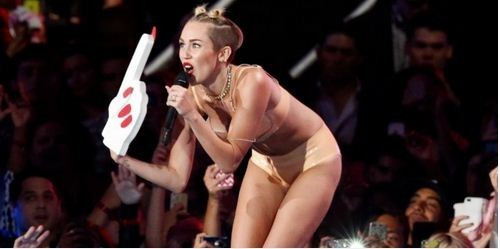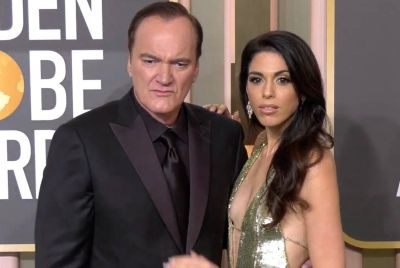After Miley Cyrus and Rihanna, the Sexualisation of Pop Videos Has to Stop
Holly Dustin, of the End Violence Against Women Coalition, reveals a new project to stamp out lurid system in music videos.

The last year has seen huge concern about music videos by Robin Thicke, Miley Cyrus, Rihanna, Calvin Harris and others that present sexualised and racialised images of women and promote harmful stereotypes. This is not a morality issue, rather one of women's safety and equality.
There is growing evidence to suggest that a sexualised media, which includes music videos, provides a conducive context for violence against women and girls to flourish by portraying women as constantly sexually available and men as sexual predators. The way black women are portrayed is particularly stereotyped and sexualised in many videos.
This is the backdrop to a society in which one in three girls in the UK say that they are 'groped' at school, or experience other unwanted sexual contact, where sexual harassment is routine at work, on public transport and other public spaces and where boys' increasing access to online pornography is having a negative impact on the way they see women.
Following a series of reviews, most recently the Bailey Review on the Commercialisation and Sexualisation of Childhood, the UK Government is putting in place a series of measures to tackle sexualisation including tighter guidelines on outdoor ads containing sexualised imagery, age-ratings on video games, restricting children's access to pornography and criminalising the possession of 'rape pornography'.
The proposals contained in the review have been the subject of numerous government summits and Ministerial meetings, and the agenda has the personal backing of Prime Minister David Cameron.
Now a new project, Rewind and Reframe, has been set up by leading women's groups in the UK, the End Violence Against Women Coalition, Imkaan and Object, funded by Rosa, to provide a platform for young women to speak out about sexism and racism in music videos by blogging and sharing their experiences on a new website. In the words of one of the young women from the project:
"There are times when I hate myself for liking certain kinds of music or song. They have good beats but the videos and the message is sometimes completely repulsive, and even hateful... Music videos are affecting dance too, women are just expected to dance in a sexual way... There is nothing left for women that has not been sexualised. People always talk about choice, but where is my choice to not be sexualised when everyone expects and sees only that when they look at me?"
The campaign is being launched at an event in Parliament tonight, 11 November, chaired by Kerry McCarthy MP and with panellists including the prime minister's former adviser on the sexualisation and commercialisation of childhood, Claire Perry MP, Shadow Equality Minister Sharon Hodgson MP, Ikamara Larasi from Imkaan, Graham Hill from the British Board of Film Classification (BBFC) and writer and performer Amy Lamé. It comes just days after a Netmums survey found huge parental concern about the issues.
The Rewind&Reframe project has four key goals:
- For the music industry (artists, labels and music companies) to stop creating images that are harmful and promote racial and sexual stereotypes
- For the UK Government to bring music videos into line with films, video games and other media by introducing age-ratings
- For video hosting platforms such as Vevo to have robust terms and conditions on explicit and harmful content, and for these to be enforced properly
- For all schools to counter the harmful messages that young people receive from the media by teaching the importance of respectful and consensual relationships as well as media literacy
The government has already agreed to remove the exemption from music videos sold in shops so that they are age-rated and this is likely to come into force in 2014. However, this does not go far enough as most videos are viewed online now so the system should be extended here, as recommended by the government's own review.
Discussions are taking place behind closed doors between the government and the music industry about this issue and there are clearly technical issues to resolve about the practical application, but it is worth noting that the BBFC is already providing age ratings for some digital content and that gambling sites already require age-verification online. The government is introducing online filters as part of its efforts to restrict children's access to harmful material and age-ratings for music videos could be linked to this.
Rewind&Reframe wants to start a debate about how we can create a more vibrant, creative pop culture that does not perpetuate lazy and harmful stereotypes about women, especially Black women. Join the debate at #rewindmusicvids @rewindreframe rewindreframe.org.
Holly Dustin is a director of the End Violence Against Women Coalition, which calls on government, public bodies and others to take concerted action to make women's lives safer. Visit the website for more information.
© Copyright IBTimes 2025. All rights reserved.





















